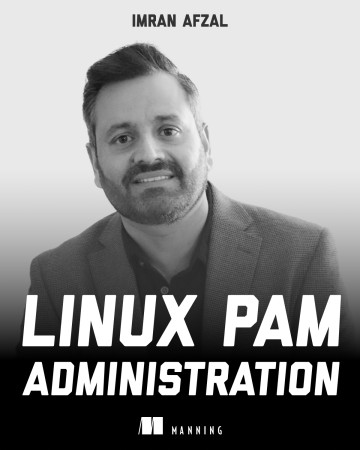pro $24.99 per month
- access to all Manning books, MEAPs, liveVideos, liveProjects, and audiobooks!
- choose one free eBook per month to keep
- exclusive 50% discount on all purchases
- renews monthly, pause or cancel renewal anytime
lite $19.99 per month
- access to all Manning books, including MEAPs!
team
5, 10 or 20 seats+ for your team - learn more

Linux PAM (Pluggable Authentication Modules) is a suite of libraries for authenticating users of applications and services in a Linux system or server. Essentially, PAM centralizes the process of authentication for myriad programs. It is a powerful tool, but it’s crucial to understand how it works, as it affects the security of much of your system.
Whether you use Linux at home, or at work as a system administrator, knowing at least the basics of PAM will help you keep your system secure and functional. In this course, we start with an overview of what PAM does and why it is important. Then we then look at the PAM file configuration formats, module interfaces, and how it communicates with the server.
Homework, handouts, and a quiz reinforce your learning.
Distributed by Manning Publications
This course was created independently by Imran Afzal and is distributed by Manning through our exclusive liveVideo platform.
about the instructor
Imran Afzal provides onsite and online training on many IT subjects. He has some of the best-selling and highest-rated courses online, with over 400,000 students worldwide. He has helped thousands of people to land the job of their dreams in IT.
Imran has over 20 years of experience in systems administration and engineering, leadership, entrepreneurship, training, and public speaking. He started his career with Time Warner (New York City) in 2000 as a systems administrator, and now manages a large team of systems engineers, administrators and team leads globally. Imran has put his IT skills to work in many fortune 500 companies in the domains of finance, fashion, tech media, and more. Projects he has spearheaded include datacenter migration, introduction and deployment of VMWare, monitoring tools implementation, Amazon cloud migration and more.
Imran earned a bachelor’s in Computer Information Systems from Baruch College, City University of New York and his Master of Business Administration (MBA) from New York Institute of Technology (NYIT). He has also received numerous certifications, including Linux Systems Management, UNIX Operating Systems, Linux System Administration, System Internals, VMWare Certified Professional, RHCSA and Windows Server Certified.
- Quality lessons from expert programmers.
- Rich, interactive transcripts for navigation.
- Exercise driven learning.
team
- five seats for your team
- access to all Manning books, MEAPs, liveVideos, liveProjects, and audiobooks!
- choose another free product every time you renew
- choose twelve free products per year
- exclusive 50% discount on all purchases
- renews monthly, pause or cancel renewal anytime
- renews annually, pause or cancel renewal anytime
-
![]() Linux PAM Administration liveVideo for free
Linux PAM Administration liveVideo for free
















 Linux PAM Administration liveVideo for free
Linux PAM Administration liveVideo for free